

Death of the West 1of2: Frankfurt School, Cultural Marxism, Political Correctness. Death of the West 2of2: Frankfurt School, Cultural Marxism, Political Correctness. Frankfurt School - Social Marxism in the USA. The History of Political Correctness (Complete) Critical theory. Critical theory is a school of thought that stresses the reflective assessment and critique of society and culture by applying knowledge from the social sciences and the humanities.
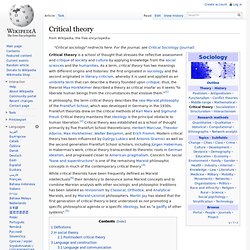
As a term, critical theory has two meanings with different origins and histories: the first originated in sociology and the second originated in literary criticism, whereby it is used and applied as an umbrella term that can describe a theory founded upon critique; thus, the theorist Max Horkheimer described a theory as critical insofar as it seeks "to liberate human beings from the circumstances that enslave them. "[1] Critical philosophy. Attributed to Immanuel Kant, the critical philosophy movement sees the primary task of philosophy as criticism rather than justification of knowledge; criticism, for Kant, meant judging as to the possibilities of knowledge before advancing to knowledge itself (from the Greek kritike (techne), or "art of judgment").
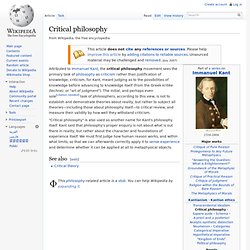
The initial, and perhaps even sole[citation needed] task of philosophers, according to this view, is not to establish and demonstrate theories about reality, but rather to subject all theories—including those about philosophy itself—to critical review, and measure their validity by how well they withstand criticism. "Critical philosophy" is also used as another name for Kant's philosophy itself. Kant said that philosophy's proper enquiry is not about what is out there in reality, but rather about the character and foundations of experience itself.
Positivism. Positivism is the philosophy of science that information derived from logical and mathematical treatments and reports of sensory experience is the exclusive source of all authoritative knowledge,[1] and that there is valid knowledge (truth) only in this derived knowledge.[2] Verified data received from the senses are known as empirical evidence.[1] Positivism holds that society, like the physical world, operates according to general laws.
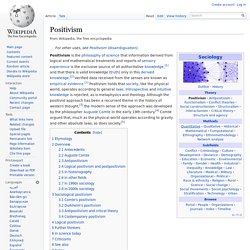
Introspective and intuitive knowledge is rejected, as is metaphysics and theology. Although the positivist approach has been a recurrent theme in the history of western thought,[3] the modern sense of the approach was developed by the philosopher Auguste Comte in the early 19th century.[4] Comte argued that, much as the physical world operates according to gravity and other absolute laws, so does society.[5] Etymology[edit] Overview[edit] Antecedents[edit] Auguste Comte[edit] Antipositivism[edit] Main article: antipositivism. Frankfurt School. The Frankfurt School (German: Frankfurter Schule) is a school of neo-Marxist interdisciplinary social theory,[1] associated in part with the Institute for Social Research at the Goethe University in Frankfurt, Germany.
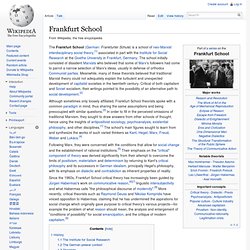
The school initially consisted of dissident Marxists who believed that some of Marx's followers had come to parrot a narrow selection of Marx's ideas, usually in defense of orthodox Communist parties. Meanwhile, many of these theorists believed that traditional Marxist theory could not adequately explain the turbulent and unexpected development of capitalist societies in the twentieth century. Critical of both capitalism and Soviet socialism, their writings pointed to the possibility of an alternative path to social development.[2] History[edit] The Institute for Social Research[edit] Weil (1898-1975), a young Marxist, had written his doctoral thesis (published by Karl Korsch) on the practical problems of implementing socialism.
New Left. The New Left was a term used mainly in the United Kingdom and United States in reference to activists, educators, agitators and others in the 1960s and 1970s who sought to implement a broad range of reforms on issues such as gay rights, abortion, gender roles, and drugs,[2] in contrast to earlier leftist or Marxist movements that had taken a more vanguardist approach to social justice and focused mostly on labor unionization and questions of social class.[3][4] They rejected involvement with the labor movement and Marxism's historical theory of class struggle.[5] In the United States, the "New Left" was associated with the Hippie movement and anti-war college campus protest movements including the Free Speech Movement.
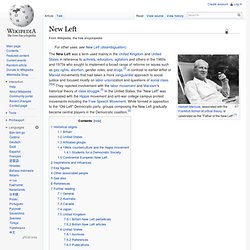
While formed in opposition to the "Old Left" Democratic party, groups composing the New Left gradually became central players in the Democratic coalition.[2] Historical origins Britain The Marxist historians E. P. United States Other elements of the U.S. Political correctness. In modern usage, the terms PC, politically correct, and political correctness are pejorative descriptors, whereas the term politically incorrect is used by opponents of PC as an implicitly positive self-description, as in the cases of the conservative, topical book-series The Politically Incorrect Guide, and the liberal, television talk-show program Politically Incorrect.
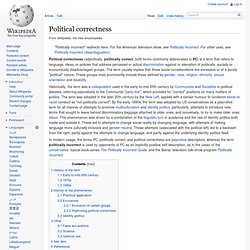
Western Humanities Alliance - Contacts. WHA History The Western Humanities Alliance was originally founded in 1982 by Murray Krieger, Ian Watt and Hayden White as the Humanities Institute, "a forum for interdisciplinary exchange in the human sciences.

" The founders' purpose was to provide an opportunity for scholars in the American West to share their interests unrestricted by fields of specialization and free from the pressures of professional conventions. The annual meeting was intended to be at once scholarly and convivial, allowing speakers time to dilate on their work and on related questions in the humanities and social sciences.